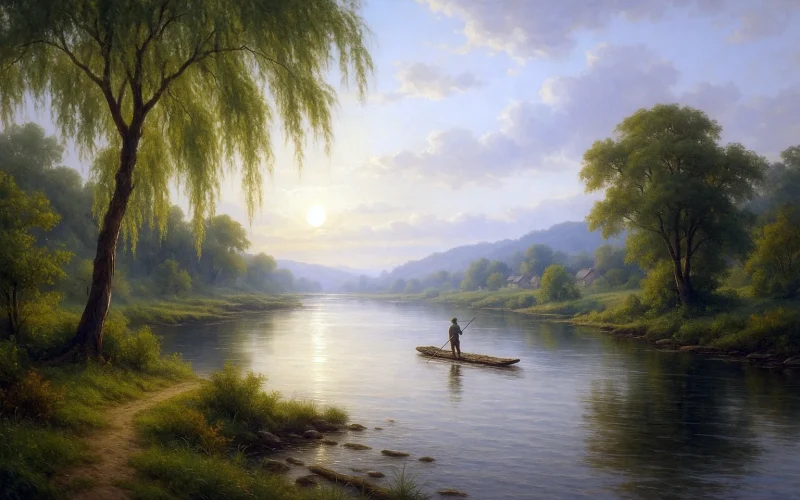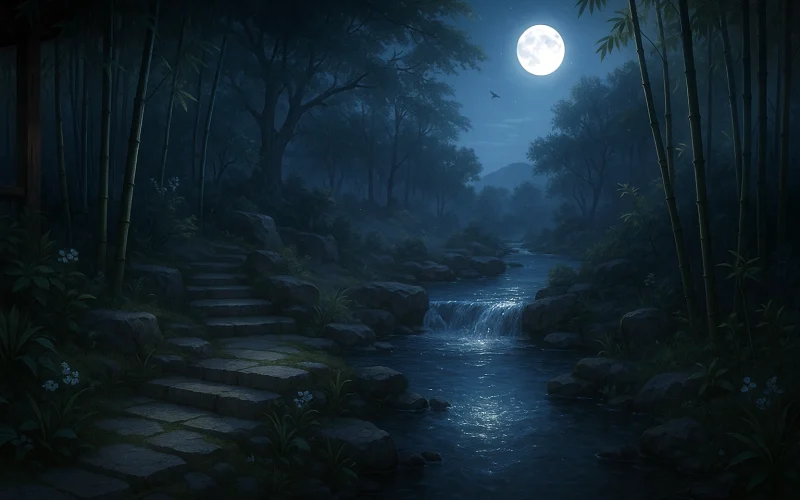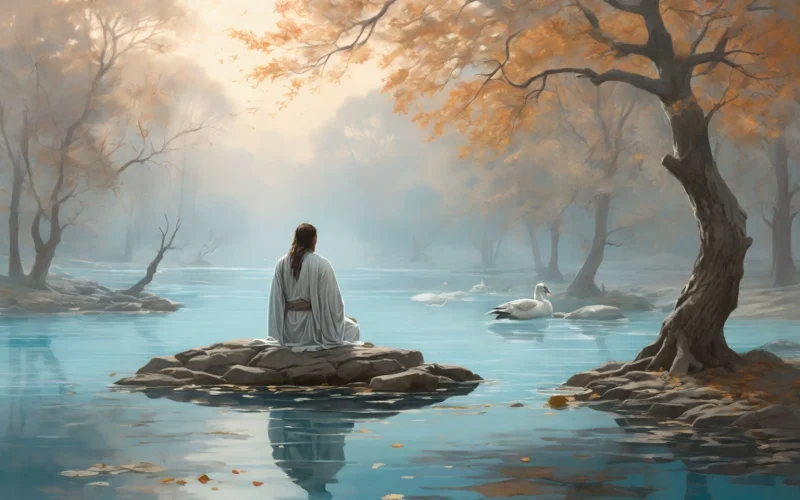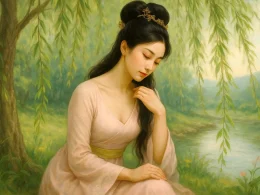River rains clear—I long to roam,
Westward to Yu Creek alone I come.
At the crossing, fallen waters show village lanes,
Chaotic rafts stranded in trees' domains.
Original Poem
「雨晴至江渡」
柳宗元
江雨初晴思远步,日西独向愚溪渡。
渡头水落村径成,撩乱浮槎在高树。
Interpretation
This poem was composed during the Yuanhe era (806-820 AD) of Emperor Xianzong of Tang, while Liu Zongyuan was in exile in Yongzhou. According to scholarly research, it was likely written in the summer of the sixth year of Yuanhe (811 AD), recording a scene witnessed by the poet at the Fool's Creek ferry after a major flood. Yongzhou, located in southern Hunan, experienced frequent rainfall in spring and summer, causing rivers to swell easily. In his "Prayer for Clear Weather at the Shun Temple," Liu Zongyuan described the suffering brought by excessive rain: "From spring through summer, incessant rain has harmed the millet and grain, repeatedly causing disaster." This indicates the severity of the floods at that time. The poem describes the poet going alone to the Fool's Creek ferry—the location of his "Eight Fools" garden—after a long period of rain had finally cleared.
"Fool's Creek" was the place where Liu Zongyuan settled on the west bank of the Xiao River in Yongzhou. He renamed Ranxi as "Fool's Creek" and gradually constructed the "Eight Fools" scenic spots, including Fool's Mound, Fool's Spring, Fool's Hall, and Fool's Pavilion. These landscapes were a carefully constructed spiritual refuge in his exiled life, embodying his desire to distance himself from worldly clamor and find contentment in simplicity. However, after a flood, when he returned to the riverbank, he discovered that Fool's Pavilion had been washed away—the scene of "scattered timbers lodged in the high trees" was precisely the tragic sight of the pavilion's wood, swept away by the flood, caught in the high branches. This discovery was nothing less than a spiritual blow for the poet. Fool's Pavilion was built with his own hands; it was a place for dialogue with the landscape, a physical symbol of his self-mocking "foolishness." Now, with the pavilion destroyed and its timbers scattered, it was as if his life's ideals had once again been shattered by relentless reality. The entire poem uses plain language to convey deep pain, without a single word of explicit lament, yet lament permeates every line.
First Couplet: "江雨初晴思远步,日西独向愚溪渡。"
The river rain just cleared, I longed to take a distant stroll;
At day's decline, alone, toward Fool's Creek ford I made my way.
The first line describes the clearing after rain. The three words "longed to take a distant stroll" reveal the poet's state of being long confined indoors—days of overcast rain likely left his mood as gloomy as the weather; now, with the sky clearing after rain, the thought of going out for a walk arose. This word "longed" ("思") is the starting point of the entire poem, connecting the improved weather with the subtle shift in his mood.
The second line, "At day's decline, alone, toward Fool's Creek ford I made my way," specifies the time and direction. "Day's decline" is the evening, as the sun slants westward; the two words "alone, toward" literally describe walking alone but also imply political isolation and spiritual loneliness. "Fool's Creek ford" is the destination, where his familiar Fool's Pavilion and Fool's Pond were located—his spiritual home. The single word "alone" ("独") casts an atmosphere of solitude over this excursion from the very beginning.
Second Couplet: "渡头水落村径成,撩乱浮槎在高树。"
At the ford, the waters fell; the village path took form again;
But scattered, tangled, driftwood lodged in the high trees.
This couplet is the core of the poem, using a strange scene to fully express the poet's inner shock and desolation. "At the ford, the waters fell; the village path took form again" depicts the scene after the flood receded—the water subsided, the path reappeared, everything seemed to be returning to normal. However, the following line, "But scattered, tangled, driftwood lodged in the high trees," completely shatters this sense of "recovery." "Driftwood" refers to timber washed in by the flood, which should normally float downstream or lie stranded on the bank; here, however, it is "in the high trees"—swept up by the flood and caught in the high branches. This image is extremely abrupt and visually striking: trees should not have such timbers; timbers should not be at such heights. This scene, defying normal logic, is precisely testimony to the flood's violence.
And this "driftwood" was likely the wreckage of Fool's Pavilion. Those scattered timbers were once part of the pavilion the poet himself built; now, they are strewn about, caught in the treetops. The poet does not directly say "the pavilion is destroyed," does not directly express "grief," but this image of "scattered, tangled, driftwood lodged in the high trees" says it all. The word "scattered, tangled" ("撩乱") describes both the disorder of the timbers and the turmoil of his emotions; the driftwood in the "high trees" is both a trace of the flood's destruction and a symbol of the poet's shattered ideals.
Holistic Appreciation
This short poem of only twenty-eight characters uses extremely concise brushstrokes to contain extremely deep emotion. The first two lines narrate, stating the time, direction, and purpose of the outing in a plain tone; the last two lines describe a scene, presenting an image that defies normal logic, yet conceals deeply stirring emotion. The entire poem moves from plainness to the extraordinary, from narration to symbolism, achieving a layered progression of emotion within an extremely brief span.
The poet does not directly express his pain over the destruction of Fool's Pavilion, nor directly lament his fate; he simply lets the reader see the strange sight of "scattered, tangled, driftwood lodged in the high trees." Letting the image speak for itself, letting the imagery itself carry the emotion—this is the superb realm of classical Chinese poetry where "not a single word is used, yet the entire effect is achieved." The loneliness of "alone, toward," the disturbance of "scattered, tangled," and the abruptness of "high trees" together constitute the poet's complex and deeply pained state of mind at this moment.
Artistic Merits
- Emotion Lodged in Scene, Feeling Within the View: The entire poem contains not a single word of direct emotional expression, yet through words like "alone, toward," "scattered, tangled," and "high trees," it harbors loneliness, shock, and desolation.
- Striking Imagery, Full of Tension: The image of "driftwood lodged in the high trees" defies normal logic, possesses immense visual impact, becomes the poetic eye of the entire work, and is unforgettable.
- Concise Language, Subtle and Profound: Within twenty-eight characters, there is narration, description, and symbolism; the words are simple, the meaning rich, leaving endless aftertaste.
- Natural Structure, Layered Progression: The poem begins with the desire to "take a distant stroll," progresses to "alone… made my way," then shifts to what was seen "at the ford," and finally focuses on "driftwood… in the high trees." The emotional arc unfolds with perfect clarity, deepening with each step.
Insights
This poem first enlightens us about a composed posture in the face of ruin. The destruction of Fool's Pavilion was undoubtedly a blow to Liu Zongyuan—it was a spiritual home he had built with his own hands, part of his "Eight Fools" garden. Yet the poem shows no crying out to heaven, no weeping; there is only the calm statement, "scattered, tangled, driftwood lodged in the high trees." This composed posture in facing ruin is itself a form of spiritual strength. It tells us: life will always have unexpected destruction, but we can choose how to face it—not to be overwhelmed by sorrow, but to let sorrow condense into verse, to let ruin become a new starting point.
The strange image of "driftwood lodged in the high trees" also makes us contemplate the traces left by disaster. The flood recedes, the village path reappears, everything seems restored. But the driftwood hanging in the trees reminds people: disaster has been here, change has occurred. Some scars, even if they heal on the surface, leave permanent marks. This enlightens us: True recovery is not erasing the traces, but learning to coexist with them. Those scars become part of our lives, reminding us of past experiences and shaping who we are today.
Furthermore, this poem enlightens us about how to see the possibility of poetry within ruin. The scene of "scattered, tangled, driftwood lodged in the high trees" is one of wreckage and decay, yet under the poet's brush, it becomes the poetic eye of a timeless masterpiece. Liu Zongyuan was not defeated by the ruin; instead, he distilled poetry from it. This ability to transform suffering into aesthetics is the most precious gift of literature. It teaches us: even if life hands us ruin, we can, with a different perspective, discover a different kind of beauty and meaning within it.
Finally, the figure of that person "alone, toward Fool's Creek ford" is especially moving. At sunset, after the long rain finally cleared, the poet went alone to that familiar place—he knew what he might see; perhaps he had prepared himself mentally. But he still went; he still went to face it. This courage to walk alone toward fate, to face the truth alone, is the most precious spiritual legacy Liu Zongyuan leaves us. It reminds us: on life's road, often we can only go "alone, toward." But as long as we have the courage to take that step, we can never truly be defeated.
About the Poet
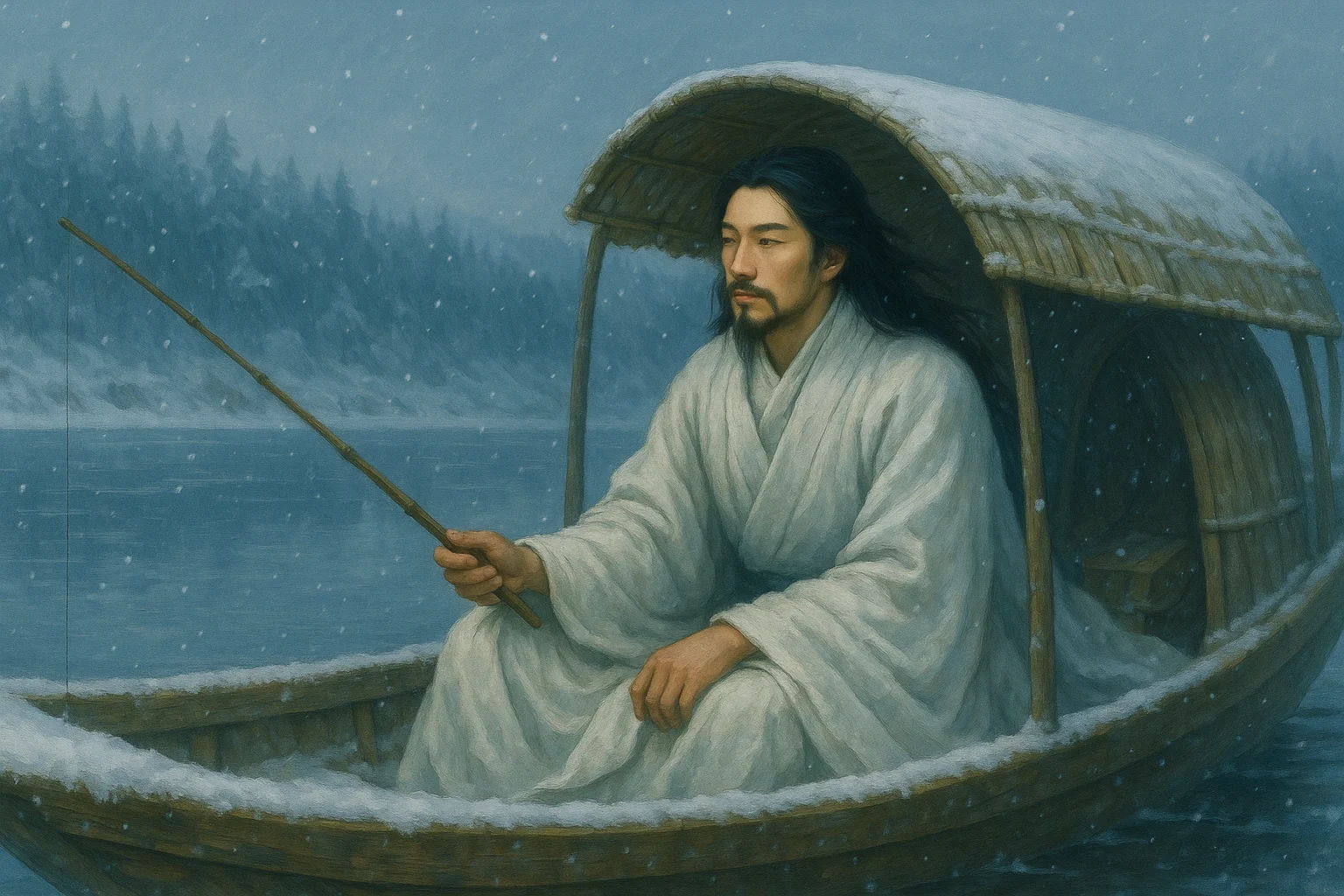
Liu Zongyuan (柳宗元, 773 - 819), a native of Yuncheng in Shanxi province, was a pioneering advocate of the Classical Prose Movement during China's Tang Dynasty. Awarded the prestigious jinshi degree in 793 during the Zhenyuan era, this distinguished scholar-official revolutionized Chinese literature with his groundbreaking essays. His prose works, remarkable for their incisive vigor and crystalline purity, established the canonical model for landscape travel writing that would influence generations. As a poet, Liu mastered a distinctive style of luminous clarity and solitary grandeur, securing his place among the legendary "Eight Great Masters of Tang-Song Prose" - an honor reflecting his enduring impact on Chinese literary history.






